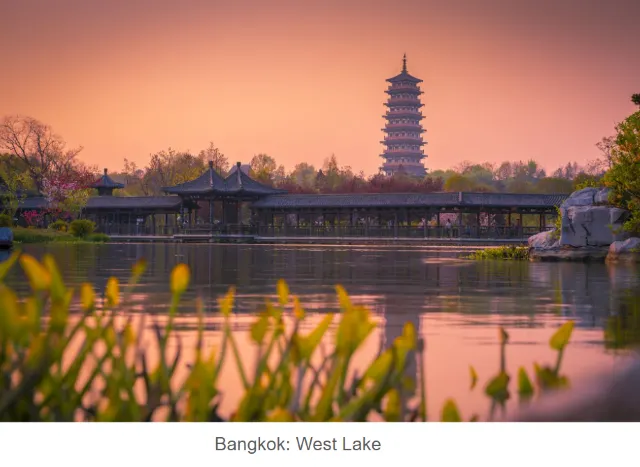Hangzhou Travel Guide 2022: Attractions and Tours
Catalogue
- 1. How to Plan a Trip to Hangzhou
- 2. How to get to Hangzhou - Hangzhou Transportation: Flights
- 3. Hangzhou Transportation: Train, Cruise, Metro, Taxi
- 4. Hangzhou Weather - Best Time to Visit Hangzhou
- 5. Top 3 Things to Do in Hangzhou
- 6. Hangzhou Food | Cuisine, What to Eat, Where to Eat
- 7. Where to Shop and What to Buy in Hangzhou
- 8. Hangzhou Local Culture, culture in Hangzhou
Show More
Located in East China's Yangtze River Delta and the northern part of Zhejiang Province, Hangzhou is a major commercial and trade city with an estimated urban population of 8 million people. There are 10 urban districts with Gongshu District being the central heart of the city and enjoys convenient transportation. Xihu District is to the west of the city and where the famous West Lake is located.

Historically, Hangzhou has for centuries been known for its fine silk and tea productions, but the city didn’t reach its political importance until Southern Song Dynasty (1127-1279 AD) when the Emperor relocated the capital to Hangzhou. The city’s wealth and commerce grew further in the Ming Dynasty after the construction of the Grand Canal - the oldest and longest canal in the world - linking Hangzhou to Beijing and other ocean trade routes. Today, Hangzhou continues to be an economic center of east-central China.
Most people traveling to Hangzhou by air will use the Hangzhou Xiaoshan International Airport. This large international airport has several transfer options to the city including airport shuttle buses (around 20 routes in and around the city), taxi, and car rental. Getting around town is also easy and budget-friendly, as there are lots of city bus lines and 5 special sightseeing bus lines that can take visitors to most attractions across Hangzhou. There is also an efficient Metro system and abundant taxis available as transport options.
From the beautiful West Lake to romantic bridges, tranquil tea plantations to ancient shrines and temples, Hangzhou is one of the country's most popular tourist destinations. There are so many awe-inspiring scenic spots in Hangzhou, it will take a few days to just tick off the top destinations. For those unforgettable experiences, visitors can consider taking a sunset stroll or ride a bike around the West Lake, visit a picturesque water town outside Hangzhou (e.g. Wuzhen and Xitang), learn about the tea culture, or see a Giant Panda in Hangzhou Zoo, etc.
🏃♂️As the majority of Hangzhou’s top attractions are outdoors, such as West Lake and XiXi National Wetland Park, visiting in the best season is vital. Spring and Fall are the peak tourist periods when Hangzhou has the most pleasant weather with sunny days and mildly warm temperatures. Note that national holidays in May, October, and Spring Festival periods will be extremely crowded.
Knowing where to stay in a new city can make all the difference on a trip. In Hangzhou, Wulin Square (northern side of West Lake) and Yan'an Road are two of the busiest areas with convenient transportation facilities. Want that perfect view of the West Lake? There is a wide range of 4-5-star deluxe hotels available as well as guesthouses all around the lake.
It’s not easy navigating a new city using public transports, especially when you don’t speak the local language. Here are some useful transportation-related tips. Most taxi drivers rarely speak or read English, so it is best to prepare your destination names in Chinese or Pinyin. In Hangzhou, the bus schedules and on-board announcements are all in Chinese, so download the Google Maps app on your mobile phone so it can help you track your movement. Bus fares can be paid in cash but use small coins or bills only as no change is given. Also, typically on buses in China, passengers are expected to board via the front doors and leave through the rear.
Trying the local cuisine can elevate a trip from good to great. Food in Hangzhou is delicate and light with a mild sweet taste. Be sure to savor local specialties dishes like Sweet and Sour West Lake Fish and Dongpo Pork. Want to bring home some souvenirs? Hangzhou is the home to a plethora of quality local products, such as Hangzhou silk, Longjing tea, snuff boxes, and fans.
Being the provincial capital of Zhejiang Province, Hangzhou Xiaoshan International Airport (HGH) is the key airport for the city and the region (Yangtze River Delta Economic Zone). HGH is located 27 kilometers (17 miles) east of downtown Hangzhou in the Xiaoshan District. The airport is a hub for Air China, China Eastern Airlines, China Southern Airlines, Hainan Airlines, and Sichuan Airlines. There are daily flights to and from major cities in China and internationally to Asia, Australia, Europe, the Middle East, and North America. Also known as the “Garden Airport”, its 3 terminals boast useful facilities like free Wi-Fi, ATMs and banking facilities, currency exchange, medical services, Hangzhou tourist center, and numerous retail and dining options.
Transfer options between the HGH and Hangzhou city center include airport shuttle, taxi, and car rental. A convenient and affordable method is by airport shuttle which offers around 20 routes to various parts of downtown. Depending on your destination, a trip can take between 45-100 minutes. All buses depart from the first level of the terminal building, outside the Arrivals Hall. Tickets range from 15-35 RMB and can be purchased on board from the driver or at the Shuttle Bus booths at the end of the Arrivals Hall.
The fastest way is by taxi with journeys typically taking 35 minutes up to an hour depending on traffic conditions. The taxis are metered and the fare to the city center should be around 100 RMB. Visitors can find taxis outside Gate 10 of Arrivals Hall (Domestic Terminal Building). Please note that taxi drivers rarely speak or read English, so it is best to prepare your destination name in Chinese or Pinyin.
The most popular forms of Hangzhou transportation are bus, metro, or taxi. Hangzhou’s bus system is extensive, budget-friendly, and has several different line types such as night-time, peak-hour, and sightseeing. For regular city bus lines, fares range from 1–3 RMB. As the bus schedules and on-board announcements are all in Chinese, it is advisable to download the Google Maps app on your mobile phone which will help you track your movement. Being a popular tourist city, Hangzhou has 5 special sightseeing bus lines (Y2, Y6, Y8, Y9, Y10). Useful bus routes (regular and sightseeing) for tourists include Y2 bus which goes from the Main Train Station to Lingyin Temple; Bus K7 stops on the western side of West Lake; Bus 27 runs from Beishan Lu to Longjing Tea Village while Bus 87 connects most of the sites in the tea plantation region.
The Metro system in Hangzhou is efficient but compact, with only 5 lines currently in operation. With plans to open more lines, it is recommended to download the most up-to-date Metro map when traveling. Fare starts at 2 RMB and will increase with distance traveled. One Day and Three Day Passes are also available.
Other ways to get around town include flagging down one of nearly 10,000 taxis in the city. Fare starts at 11 RMB and is priced by kilometer. It is worth noting that the majority of taxi drivers rarely speak or read English, so it is best to prepare your destination name in Chinese or Pinyin, or point out the location/tourist site on a map. For those who are more adventurous, Hangzhou is a bike-friendly city, so visitors can consider renting a bike, especially when touring the scenic and expansive West Lake area.
Hangzhou has a subtropical monsoon climate which means four distinct seasons with wet and hot summers, and cold and cloudy winters. With summer lasting from June to September, the hottest month is July when the temperature could reach 33°C (91°F). Late June to early July is the rainy period (Plum Rain Season) when the air is humid, and rainfall increases significantly. Later on, in August and September, another heavy rainfall season will arrive with potential typhoons. Winter in Hangzhou is between December and February, the temperature at times plunges to 0 °C (33 °F) in the coldest month January. Hence weather-wise, the best times to visit Hangzhou is Spring or Fall when it is generally sunny, cool, and dry.
Due to the pleasant weather, Spring and Fall are the peak tourist seasons in Hangzhou. Also, Spring is the best time to view peach, plum, and cherry blossoms. People rush to the city’s West Lake, hills, and parks to enjoy the great outdoors. Beside Spring and Fall, other peak times for Hangzhou are national holiday periods when millions of domestic tourists tend to descend on the city. To avoid extreme crowds, pick your dates carefully. Also, prices for hotels and flights will be most expensive during these times. Major Chinese holidays are the Chinese Spring Festival, Labor Day, and National Day.
Hangzhou was described by the famous traveler Marco Polo as the most beautiful city in the world. With its long list of unmissable attractions, here are three top sites for visitors with limited time.
Beyond a shadow of a doubt, West Lake or Xi Hu is a must-see locale. This massive body of water is centered in the oldest part of the city and is picturesquely surrounded by hills and temples. Being China's only world cultural heritage in the class of lakes, Xi Hu is divided into five sections by two causeways. Visitors can walk, bike, or boat around West Lake, admire its many fine old bridges like the Broken Bridge and Bridge of the Nine Arches, or enjoy the views of Isle of the Hill of Solitude and Flower Harbor.
Did you know the famous Longjing tea is actually named after a small village about 3 km (1.8 miles) southwest of West Lake? Situated in some of China's most beautiful countryside, visitors can walk around the quaint village and its many plantations, take a tour in a tea factory and learn the processes involved in making this unique green tea. There are two buses to the village from the city center or take a 20-minute taxi ride.
Hangzhou is also a fun place for the whole family as kids will be thrilled to spend a day in the Hangzhou Zoo. Exquisitely designed like traditional Chinese courtyards with white walls and black tiles, the zoo is the home to over 2,000 rare animals of 200 different species. And yes, they have pandas, two giant pandas live in the Panda House. Hangzhou’s other places of interest for kids include the National Wetland Museum of China (near the Xixi National Wetland Park) and Hello Kitty Theme Park (an hour's drive away in Anji).
If you are wondering what culinary gems await you in Hangzhou, you’ll be delighted by the delicate and exquisite dishes of Zhejiang cuisine - one of the eight culinary cuisines of China. Famed for their fish and seafood dishes, visitors to Hangzhou can’t pass up on the most celebrated local dish – Sweet and Sour West Lake Fish. The difference between this dish and other similar ones in the region (e.g. Suzhou’s sweet and sour mandarin fish) is that the fish used is from West Lake. The fish is lightly poached then topped with a sharp sweet and sour, vinegar-based sauce. Visitors can sample the best versions of this dish at Lou Wai Lou Restaurant and Wai Po Jia Restaurant.
Fear not meat lovers, it’s not all seafood galore in Hangzhou. Another favorite dish is Dongpo pork, named after the famous poet, Su Dongpo. A slab of quality pork belly is braised, sautéed, and steamed to perfect tenderness. When eaten, visitors will detect a scent of sweetness with the fragrance of rice wine.
Ever tried a dish cooked with tea leaves? Fried shrimps with Longjing tea is a classic local dish where fresh river shrimps are coated with egg white and starch, then lightly stir-fried with Longjing tea, tea leaves, and rice wine.
As a historical city with sophisticated Chinese culture, tourists will be spoiled for choice when it comes to shopping. Besides the exclusive international brands on offer, Hangzhou also has many exquisite specialty products. For example, Hangzhou silk – visitors can choose 14 types of silk here including satin, damask silk, and silk fabric. For tea lovers, the city is a great place to top up on Longjing Tea (Dragon Well Tea). Other local products worth considering are snuff boxes, handmade confectioneries, embroidered garments, and fans.
Now where to go to buy these goodies? Hefang Street is a renowned historic shopping street in Hangzhou, dating back to the Southern Song Dynasty. Visitors can take in the sights and do some shopping as it is lined with traditional buildings and stores selling local crafts. Another classic shopping area is Yan’an Road where tourists can find grand buildings such as Hangzhou Department Store, Victory Theatre, International Mansion, and Hangzhou Grand Hotel.
If shopping in upscale malls is more your thing, Hangzhou is not short of those either. The MIXC Shopping Mall has six floors of retail space with more than 100 international and domestic apparel brands. Other malls of similar caliber include Hangzhou Tower Shopping City and Xie Bai New Century Mall.
In terms of public safety, Hangzhou is relatively safe overall for tourists. But due to the high number of domestic and foreign visitors in the city, many locations like scenic spots and train stations tend to be very crowded, hence leading to an increase in petty crimes. For emergencies, dial 110 for police (or find a patrolling officer in tourist destinations) and 120 for ambulance services.
The official currency used in China is Renminbi (RMB) which is also known as Yuan. While tipping is not required in China, it is acceptable to leave a gratuity for guides, drivers, and hotel porters.
Trending Travelogues
Popular Travel Types
Popular Attractions
Recommended Attractions at Popular Destinations










Site Operator: Trip.com Travel Singapore Pte. Ltd.







